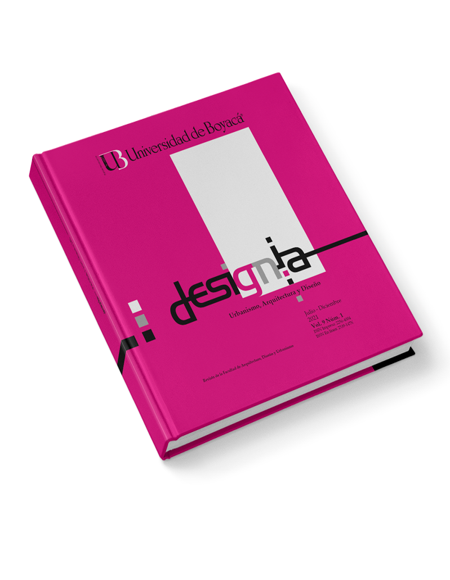Participatory urbanism. A complex pedagogical aproach
Urbanismo participativo. Una aproximación pedagógica compleja
Main Article Content
Abstract
The representative forms of the State during modernity have restricted citizen participation in the processes of creation and production of the city; however, the current denomination of the Social State of Law in Colombian legislation tends to allow greater relevance in it. It is then about presenting in this essay, an academic curricular scheme that conceives citizen activism in the idea of exercising "the right to the city" enunciated by Henri Lefebvre. For this, in the spatial emphasis that characterizes the academic training of architects, we consider essential the perspective of the triallectic of perceived-conceived-lived spatiality that Edward Soja handles in the academic interest of privileging space beyond considering it a simple environmental container element of human activity. As a complement to strengthen the formative competencies of students, we introduce in an articulated way the principles of a complex system in the manner of Edgard Morín, the dialogic, hologrammatic and recursion principle to revalue or resignify the argumentative and analytical skills that founded the idea of urbanism as a modern technocratic ideology.
Downloads
Publication Facts
Reviewer profiles N/A
Author statements
Indexed in
- Academic society
- Universidad de Boyacá
- Publisher
- Universidad de Boyacá
Article Details
References (SEE)
Asher, F. (2000). Ensayo sobre la sociedad contemporánea. París: Ed. L´eube.
Benach & Albet, (2010). La perspectiva postmoderna de un geógrafo radical. Barcelona: Icaría, Espacios críticos.
Borja, J. (2003). La ciudad conquistada. Madrid: Alianza Editorial.
García, M.; Fairen, V. (1980). Estructuras Disipativas algunas nociones básicas/1. Revista el Basilisco, 10, 8-13. Recuperado de http://www.fgbueno.es/bas/pdf/bas11002.pdf
Dieterich S. (2005). El Socialismo del Siglo XXI. Bogotá: Fundación para la Investigación y la Cultura (FICA).
Gausa, M., et al., (2005) Metapolis: Diccionario de arquitectura avanzada. Madrid, Actar.
Gómez, T. (2010). El nuevo paradigma de la complejidad y la educación. Una mirada histórica. Polis, Revista de la Universidad Bolivariana, Volumen 9 (25). 183-198 DOI: https://doi.org/10.4067/S0718-65682010000100010
Hernández, A. (2008). De la dialéctica a la trialéctica del espacio: aproximaciones al pensamiento de M. Santos y E. Soja. En Tras las huellas de Milton Santos (p. 84-97).
Barcelona: Antropos. Recuperado de http://pdfhumaniddes.com/sites/default/files/apuntes/HernandezCordero.pdf
Jiménez, S. (2006). El proyecto arquitectónico aprender investigando. Cali: Universidad de San Buenaventura.
López, R. (2012). Las teorías urbanas, un tema transdisciplinario, no neutral. Cátedra Sur: Universidad Autónoma Metropolitana y Universidad Nacional de General
Sarmiento. Memorias. Recuperado de: http://w.w.w.ungs.edu.ar/catedrasur/wp-content/uploads/2012/11/3_LOPEZ-RANGEL_VF.pdf
Llano, J. (01 de abril de 2010). El Espacio Vivido, por Juhani Pallasmaa. (Mensaje en un blog). Recuperado de https://cartografiasurbanas09.wordpress.com/2010/04/01/el-espacio-vivido-por-juhani-pallasmaa/
Molano, F. (2016) El derec ho a la ciudad: de Henri Lefebvre a los análisis sobre la ciudad capitalista contemporánea. Revista Folios, (44), 3-19. DOI: https://doi.org/10.17227/01234870.44folios3.19
Morin, Edgar. (1981). El método I. La naturaleza de la naturaleza. Cátedra. Madrid.
Morin, E. (1999). Los siete saberes necesarios para la educación del futuro. París: Editorial Santillana. UNESCO.
Prigogine, I. (1974) Introducción a la termodinámica de los procesos irreversibles. Madrid, Selecciones científica.
Reyes, C. (2011, 29 marzo). La ciudad viv. Urbanismo emergente o “Tactical Urbanism”. Recuperado de: http://w.w.w.laciudadviva.org/blogs/?p=9651
Soja, E. (2008). Posmetrópolis. Estudios críticos sobre las ciudades y las regiones. Madrid: Traficantes de sueños.
Torres, C. (compilador) (2000). La ciudad: Hábitat de diversidad y complejidad. Bogotá: Universidad Nacional de Colombia.
Vigotsky L. (1979). El desarrollo de las funciones psíquicas superiores. Barcelona: Critica.








